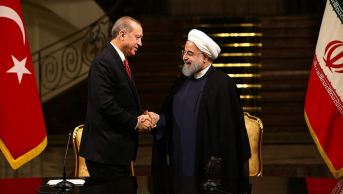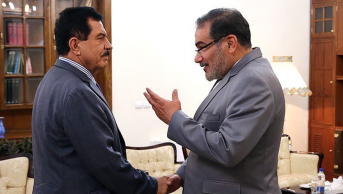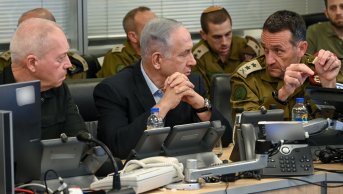Trump and Iran: Ambiguity and Anxiety

The US Presidential elections that was hold on November 8, 2016 was closely followed in Iran as it was in other parts of world. While talking on Iran and Middle East politics during his campaign, Donald Trump, Republican president-elect of the USA that has no diplomatic relations with Iran since the hostage crisis of 1979, and who would inaugurate on January 20, had given mix messages to the Iranian government.Whereas criticizing the alliance relationship between the United States and its conventional allies Saudi Arabia and other Gulf countries, he talked about good relations with Russia, which reminded a possibility of change in traditional alliances of regional and global powers. On the one hand, Trump underlined his haggling capacity as a businessman, on the other hand he promised to make America great again. Trump’s harsh rhetoric led an impression that the United States would boost its recently declining global hegemony with a power-based policy. Then, Iranian government faced with two scenarios; one is optimistic, the other is pessimistic. According to the optimistic one Trump the ‘haggler’ might handle Iran policy through a business perspective and avoid from confrontation with Tehran. According to the pessimistic scenario, Trump might play power politics, ignore the nuclear deal of July 2015 and adopt a confrontationist policy towards Tehran.
Soon after the election of Trump, Supreme Leader of Iran, Ayatollah Khamenei stated, “we neither celebrate nor mourn the US election outcomes ... Anyone coming from either of the two parties has committed pure evil ... we are prepared to combat any possible incident.” Thus, he emphasized that the lack of diplomatic relations between the revolutionary Iran and the United States would be maintained independent of policies of the American president,and underlined that Iran would be indifferent to the both scenarios. Notwithstanding the framework drawn by Khamenei, prospective implications of harsh criticisms of Trump towards the nuclear deal have been discussed widely.
Trump and JCPOA
The most important thing among the issues related to American policy towards Iran that came into agenda during the presidential elections was the nuclear deal. The nuclear deal is a global concern that involves not only the USA and Iran, but also major powers such as Russia, China and the EU, and regional countries. The deal (JCPOA) that was broken between Iran and P5+1 countries, in July 2015 in order to prevent weaponization of Iranian nuclear program was achieved at the end of a long process of negotiation, and it was presented to the public opinion as ‘the victory of diplomacy.’ This process witnessed the first direct talks between Iran and the United States under the Democrat President Obama since 1979. After the finalization of the nuclear deal, Iranian nuclear activities are brought under control of International Atomic Energy Agency, which prevented development of nuclear weapons by Iran. In turn, international sanctions that targeted Iran have been removed gradually. Despite some disagreements that emerged during the implementation of the deal, it has settled down a long-term international controversy. The deal removed the threat of ‘nuclear Iran’ for both the parties, and regional countries, and with the words of Russian President Putin, “The world [could] now breathe a sigh of relief” after Iran deal.
Donald Trump has brought debates on the nuclear deal into public agenda with his words, “My number-one priority is to dismantle the disastrous deal with Iran” in his speech at AIPAC (American-Israel Public Affairs Committee) in March 2016 as part of his presidential campaign.Trump has highlighted his strict opposition to the rise of Iran as a regional power, and has viewed the growing influence of Iran inthe Middle East as an outcome of the nuclear deal signed by the Obama administration.In addition to his confirmation of full support for Israel that called the nuclear deal as a disaster since the beginning of negotiations, the fact that Trump raised his criticisms towards the deal while addressing the Jewish-Israeli lobby at AIPAC highlighted the animosity between Iran and Israel. Indeed, the defense of Palestine and hostility towards Israel, a fundamental pillar of foreign policy identity and activities of ‘revolutionary’ Iran, has become secondary to the Syria conflict and terror of ISIS in the last couple of years.
Statements of Trump have raised two different responses in Iran. On the one hand Iran has intimidated the West, on the other hand it has recalled diplomatic rules. Whenever a dispute emerges with regard to the implementation of the deal after July 2015, Iran has intimidated the West by saying “If the West does not meet conditions, we will withdraw from the deal.” When Trump said he would “tear up the nuclear deal,” Khamenei responded on June 14, “We don’t violate JCPOA, but if other side violates it, as US presidential candidates are threatening to tear it apart, we’ll setit to fire.” Ali Akbar Velayati, former foreign minister and current advisor to Khamenei on international affairs said, in August 2016, “It is not true that Iran has no other option,” and argued that if the deal was breached Iran certainly would act according to its own interests. On the other hand, Iranian architects of the deal, President Rouhani and Foreign Minister Zarif underlined the ‘international’ characteristic of the deal. Accordingly, the nuclear deal is not a bilateral agreement between Iran and the USA, but an international agreement that is signed by six countries and sanctioned by the UN Security Council. Therefore, the United States cannot reverse the deal single-handedly. Soon after the election of Trump, Rouhaniconfirmed, “Iran will abide by the nuclear deal.” Zarif called the United States to honor the multilateral commitments of the JCPOA.
Federica Mogherini, High Representative of the EU for Foreign Affairs and Security Policy, also confirmed that the nuclear deal is a “multilateral agreement,” and she stated that she had a specific role to ensure fully implementation of the deal by all sides.Russian Deputy Foreign Minister Sergei Ryabkov stated that Russia did not support Trump’s idea to ‘review’ the deal, as well. He said, “We believe that the agreement of the ‘six’ [P5+1 countries] with Iran is balanced and represents a significant contribution to strengthening international security. Our assessment has not changed.” Nevertheless, some commentators on international affairs speculates that Russia may leave Iran, its ally in the Middle East, alone with regard to the nuclear issue if the United States approaches Russia to work with it and collectively fight against ISIS as it is signaled by Trump. According to Shireen Hunter, a well-known expert on Iranian foreign policy, Russia may “use the Iran issue as a leverageto gain concessions from America on other fronts, notably Ukraine and Syria.” She argues that considering a number of issues “ranging from trade to the future of NATO and US relations with Europe in general,” the Europeans will avoid challenging the United States on Iran.
Iranian Concerns with Regard to the Trump Cabinet
Trump’s choices for his cabinet are more alarming for Iran than his words. Although Iranian government agrees that Trump does not have an ideological outlook towards Tehran, they are anxious with selection of some people who are ‘Islamophobic’ as well as ‘Iranophobic’ for his cabinet. Among those figures who maintains the neoconservative view thatused to involve in warmongering towards Iran under President George W. Bush, the following names comes into prominence; Secretary of Defense General James Mattis, National Security Advisor General Michael T. Flynn, Vice-President Mike Pence and CIA Director Michael R. Pompeo. These cabinet figures talk about regime change in Iran, oppose the nuclear deal, and argue that Iran is a state sponsor of terrorism and it should be bombed.This fact has raised concerns among the Iranian officials that haggling and compromising side of Trump will not be effective with regard to Iran.
Trump has another play card to pressure Iran; the option to weaken the regime from inside through collaborating with Iranian opposition. As a matter of fact, some of Trump advisors including Newt Gingrich, Rudy Giuliani and John Bolton are reported to have close relations with exiled and armed opposition movement, the People’s Mojehedeen that vows to destroy the Islamic Republic in Iran. Recently, 30 political dissidents living outside Iran penned a letter addressed to Trump, and asked him to keep his promise to review regional and international implications of the nuclear deal. Although those people represent a relatively small segment of the Iranian opposition, and the largest opposition group, the Green movement, does not support such ‘anti-national’ activities, its influence may increase with the prospective rise of dissidence among ethnic and religious minorities in Iran.
Additionally, if Trump adopts a policy to reverse or breach the nuclear deal, andstrives for weakening the Iranian administration, the reformist government that represents the moderate faction inside Iran will be harmed. It may culminate in empowering of Principalists, the conservative faction that opposes to nuclear negotiations since the beginning, does not consider improving relationswith neighbors and the West as a priority,handles foreign policy through security-oriented approach rather than seeking opportunities for cooperation. Supreme Leader Khamenei currently supports President Rouhani in the nuclear agreement and for developing economic ties with other countries. However, Iran has still been way behind normalization in internal politics and has been insisting on ‘resistance economy’ policy that was evoked before the nuclear deal. In case of the reversal of the nuclear deal or the rise of serious problems with related to the implementation,Supreme Leader Khamenei might withdraw his support from the moderate policies and take a hardline position. Then, Iranian foreign policy will be more aggressive as it was before under the former President Ahmadinejad, and domestic politics willwitness further pressure on human rights and freedoms.
In conclusion, it is still early to talk about Trump’s Middle East doctrine. For this reason, a true assessment of the place of Iran under President Trump and his Middle East policies depends on to what extent he will keep his words uttered during the presidential campaign. For instance, Trump’s call for the Persian Gulf countries to shoulder further responsibility for the Gulf security distressed them. If it culminates in decreasing American commitment for security and defense of the Gulf countries, it would weaken Iran’s adversaries in the Gulf and empower its position. On the other hand, it is a mystery howTrump’s statement of “Russia, Assad and Iran are killing ISIS!” will resonate with his foreign policy to fight against terrorism. A likely cooperation with Russia to fight against terrorism means an indirect partnership with Iran, and will result in empowerment of pro-Iranian forces in the region. However, Trump’s robust support for Israel may lead Iran give prominence to and revive its interest in the Palestine issue. Then it will be a barrier that prevents any cooperation between Iran and the USA in fighting against terrorism because Iran-backed Hezbollah that is currently fighting along with Assad in Syria is viewed as a terrorist organization by Israel and the United States. To sum up, the course of current debates on the nuclear deal will also be indicative for prospective American policies on other issues related to Iran.





